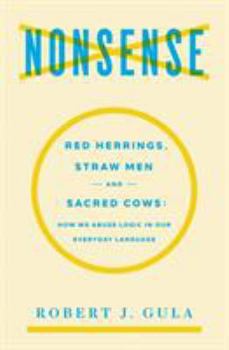Nonsense: Red Herrings, Straw Men and Sacred Cows: How We Abuse Logic in Our Everyday Language
Select Format
Select Condition 
Book Overview
A handbook of the myriad ways we go about being illogical - how we deceive others and ourselves, how we think and argue in ways that are disorderly, disorganized, or irrelevant. This description may be from another edition of this product.
Format:Paperback
Language:English
ISBN:0975366262
ISBN13:9780975366264
Release Date:March 2007
Publisher:Axios Press
Length:245 Pages
Weight:0.68 lbs.
Dimensions:0.6" x 5.4" x 8.0"
Customer Reviews
5 ratings
Clear, Concise, and Focused.
Published by Thriftbooks.com User , 16 years ago
I used to debate in college and recollect many a common place logical fallacy; although, in the course of the last year I have found myself going online more and more in order to reread the various forms in which "nonsense" takes in the public square. This caused me to pick up three non-textbook works on the subject last week. Even though the late Mr. Gula's book has a non-scholarly title it is very erudite endeavor. He dissects every form of diversion, confusion of cause and effect, oversimplication, ambiguity, and erroneous comparisons and contrasts in these pages. Specific terms are placed in bold print and allow readers to adjust and intensify their concentration accordingly. Further, he makes use of everyday, non-mathematical language which can be easily understood by laymen. I found it an enjoyable read and this is one of those rare works I will use as a reference. It was written in 1979 and some of the examples, as so many of them are political, are rather dated but one still has no difficulty grasping their meaning. I wish more people were familiar with logic...it would make the world a far better place.
Learn to spot nonsense
Published by Thriftbooks.com User , 17 years ago
What Strunk & White did for grammar with their Elements of Style, Gula does for verbal logic. Nonsense is straight forward and easy to understand. No longer will you fall prey to verbal logical fallacies used by politicians, advertisers, news reports, and others who may try to persuade you with their nonsense.
A great little book!
Published by Thriftbooks.com User , 18 years ago
I was reminded of this book last week while watching "Good Night and Good Luck" - wondering if the material may have been inspired by the events of that era. I took a Robert Gula's class on logic, fallacies, and rhetoric in high school. It was one of the most valuable courses I ever took! He published this book a few years later in hardcover. I think it had very limited distribution, but purchased a copy at the source shortly after it was published. The book is an easy read, and a great summary of the ways in which media and so-called leaders mislead and manipulate their audiences. I won't try to summarize it - just look at the table of contents and the sample chapter on the publisher's website. This should be a required course in high-school, but since that isn't likely to happen, I highly recommend this to anyone over the age of 12. Buy a copy for your parents and one for your teens!
One of the Best Short Reads on the topic of Logical Fallacies
Published by Thriftbooks.com User , 18 years ago
Want to differentiate between the heavy emotional language you hear, the logic used, and the various errors in logic? Want to know what that false argument is called? Want to find a book that does not look, feel, and read like a textbook, but can easily be read/perused at your convenience? This little paperback book (174 pages) is one of the best resource for exposing the various arguments and false logic that we humans sometimes use. The prose flows very easily, groups related fallacies together, and the author offers plenty of real-life examples. The first 3 content chapters discuss Emotional Language, its use and misuse. Then there is a chapter on Logical Fallacies. Then the author talks about Irrelevance, Confusion, Oversimplification, Evasion, Erroneous Comparison and Contrast, Arguments, Semantics, and Syllogism. "I just know that that doesn't make any sense, but I'm not sure why" begins the author in the first chapter "Everyday Nonsense." The end of the book has a summary listing of all the fallacies and nonsense terms, a Bibliography, and a useful Index. The author, Robert John Gula (1941-1989) was educated at Colby College and Harvard University. He taught a course on logic (among other subjects) at a very elite private American high school.
Counter to Do Not Buy
Published by Thriftbooks.com User , 20 years ago
The site where this book reportedly appears free is not available. I have read Mr. Gula's original book, Nonsense: How to Overcome It, and recommend it highly. I have ordered three copies of this title as Christmas gifts since the former is out of print. I do not challenge the above reviewer's credentials, only that he did not provide an actual review of Mr. Gula's work and he referenced a site that is not to be found (at least by my browser).





